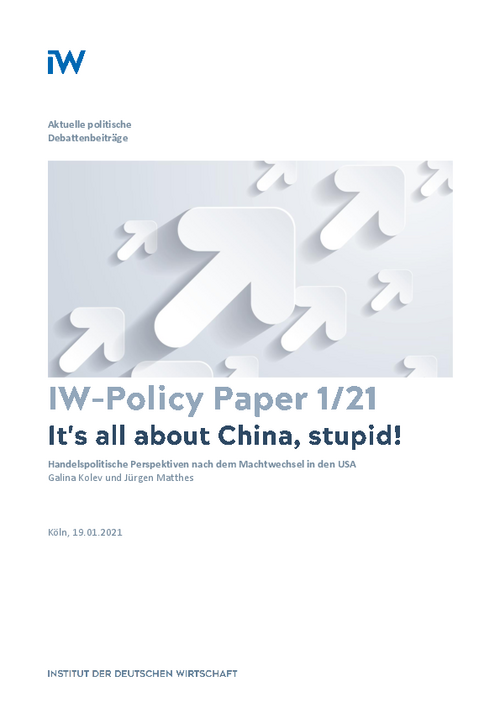The election of Joe Biden as the next US President was celebrated with great acclaim within the international community. The history of US trade policy shows that many Democrats, as US presidents, have succeeded in accelerating the trade liberalisation process.

It's all About China, Stupid!: Trade Policy Perspectives after the Change of Power in the USA
IW Policy Paper

The election of Joe Biden as the next US President was celebrated with great acclaim within the international community. The history of US trade policy shows that many Democrats, as US presidents, have succeeded in accelerating the trade liberalisation process.
The composition of the new administration underlines the intentions of the newly elected US president to end Donald Trump's confrontational course towards allies and instead to rely on cooperation to tackle common challenges, for example with regard to the design of global trade rules. But even during the election campaign, the political discourse clearly showed that the change in power will change the tone of trade policy, but less so the direction. On the one hand, trade policy is likely to play a subordinate role in the next four years in view of the domestic political challenges. On the other hand, the US President's trade policy plan for the next four years seems to have one main objective: to deal with the largely undamped rise of China and to ensure fair competition in the future.
The focus of US trade policy on China can be seen as an opportunity to jointly address the existing problems of the world trade order. However, it will increasingly give the allies, either directly or indirectly, a choice. Either they will go along with the confrontation with China and in this way not only support the USA, but also tackle their own problems with the Chinese economy. Or they will continue to try to avoid the confrontation with China, but will be less able to influence the future of the world trade order and the improvement of bilateral relations with the USA is also becoming less likely. For countries like Germany, for which both the US and China are important trade and investment partners, the question arises of what the middle ground might look like. One possible solution would be a plurilateral agreement between the EU, the USA and other economies willing to liberalise trade and operating according to market principles. In the agreement, for example, new liberalisations going beyond the WTO would be undertaken and, above all, stricter international rules would be laid down to prevent distortions of competition from industrial subsidies and state-owned companies. China's use of these instruments and its increasing relevance will lead to ever stronger distortions of competition on the world market in the future. With a plurilateral agreement of the market economies, China is given a constructive opportunity to either participate in the agreement or to agree to a substantial reform of the WTO rules for industrial subsidies. If China is not ready to take any of these steps, the plurilateral agreement can be expanded and developed into an alternative world trade order. One possibility for such a plurilateral agreement of the market economies is an expanded and revised CPTPP (Comprehensive and Progressive Agreement for Trans-Pacific Partnership), which already exists between eleven countries from the Pacific region (Australia, Brunei, Canada, Chile, Japan, Malaysia, Mexico, New Zealand, Peru, Singapore and Vietnam). There are some stumbling blocks to overcome in terms of content. But the surcharge for a reform of the global trade order should be a strategic priority for the EU and the US.

Galina Kolev / Jürgen Matthes: It's all about China, stupid! – Handelspolitische Perspektiven nach dem Machtwechsel in den USA
IW Policy Paper

More on the topic
Not so Different?: Dependency of the German and Italian Industry on China Intermediate Inputs
On average the German and Italian industry display a very similar intermediate input dependence on China, whether accounting for domestic inputs or not.
IW
China’s Trade Surplus – Implications for the World and for Europe
China’s merchandise trade surplus has reached an all-time high and is likely to rise further. A key driver appears to be a policy push to further bolster Chinese domestic manufacturing production, implying the danger of significant overcapacities.
IW